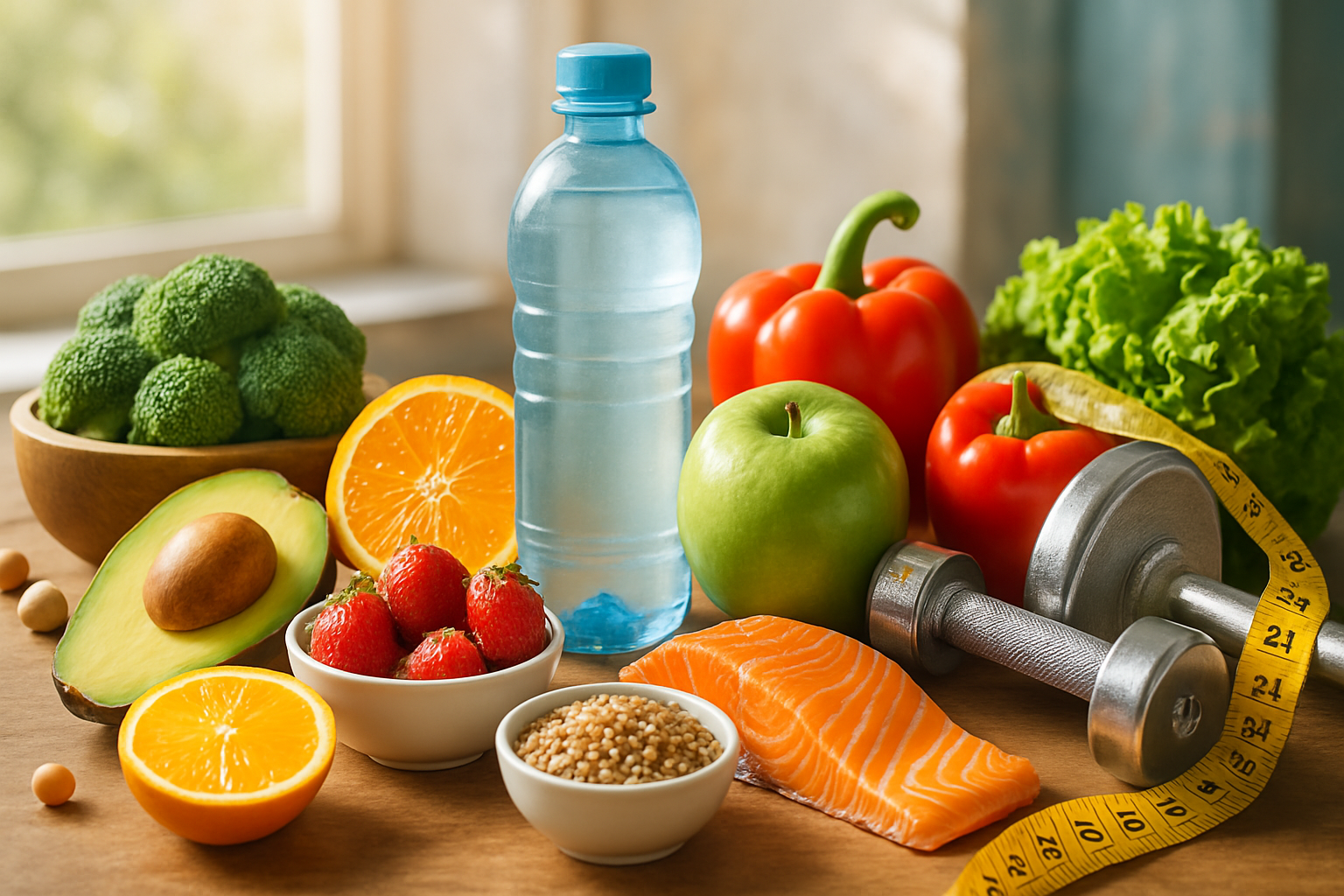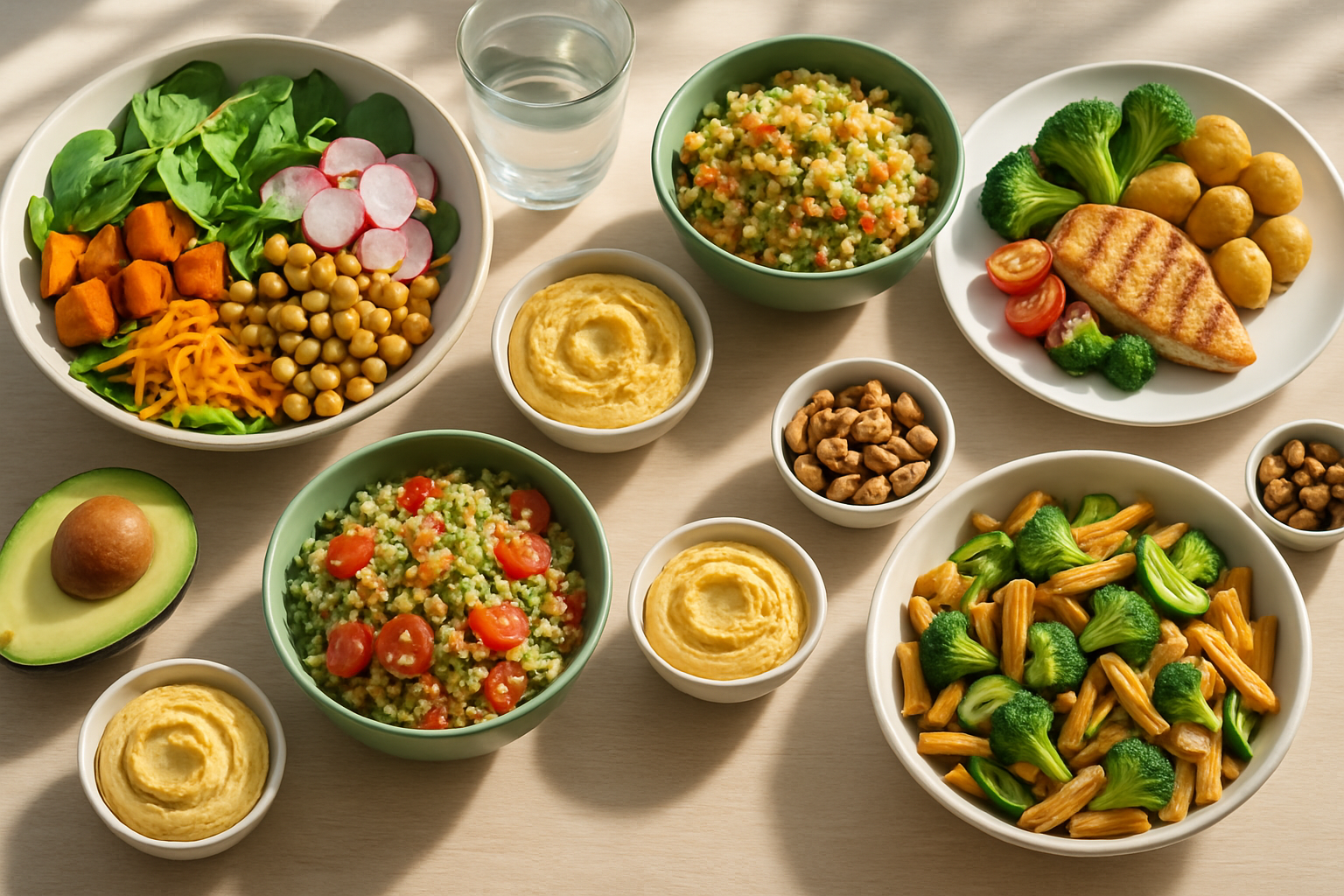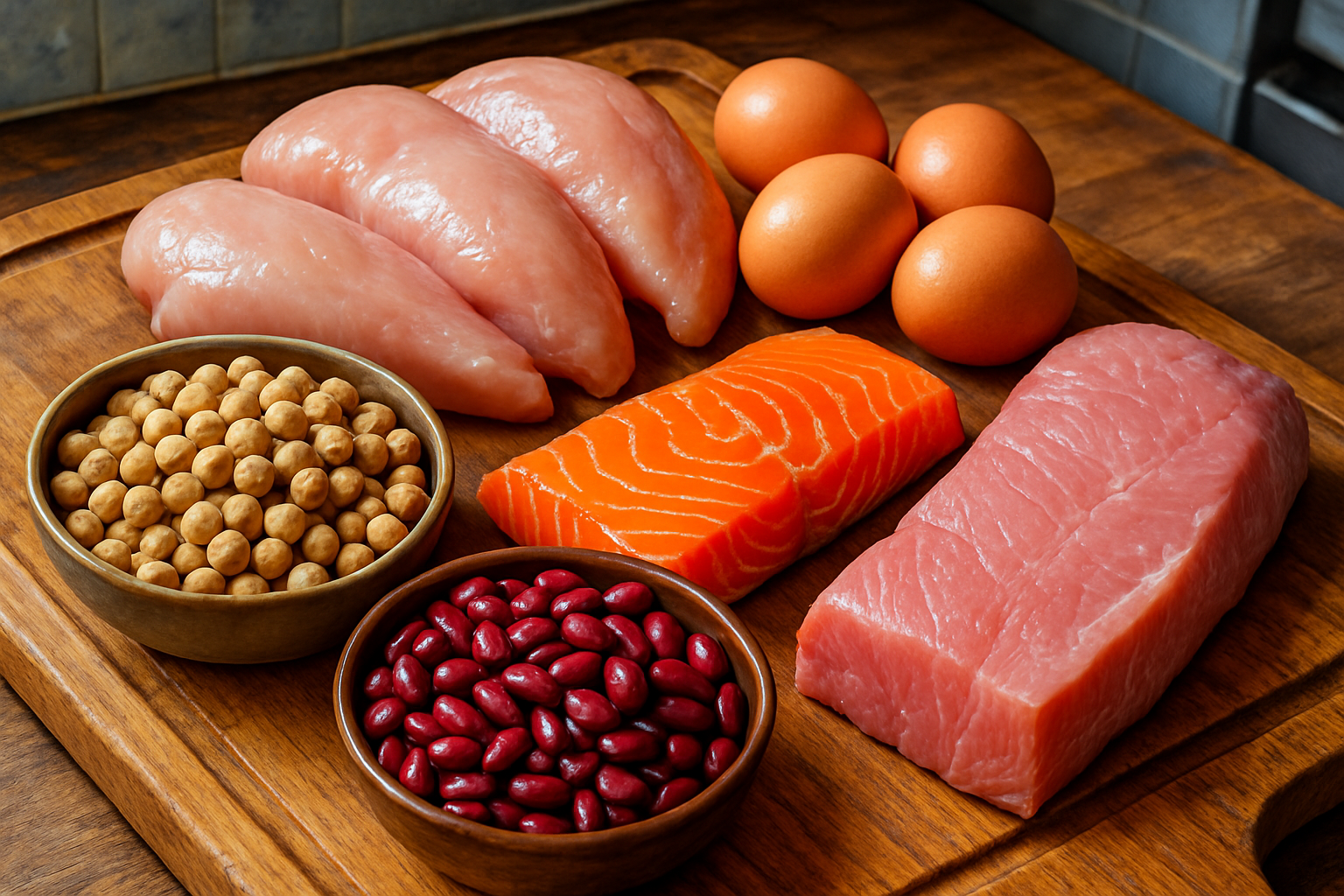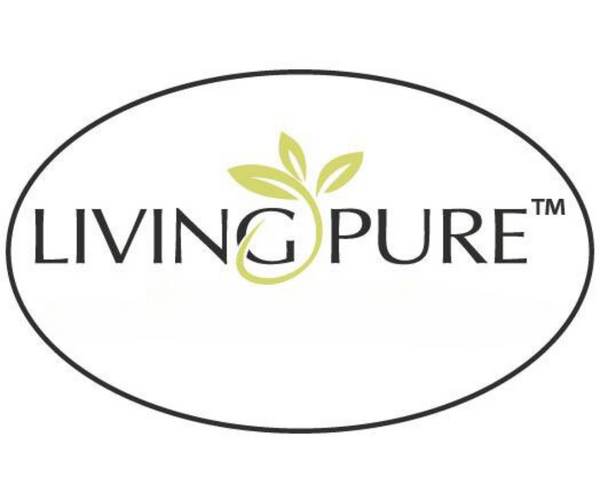Essential Nutrition Tips for Weight Loss and Muscle Gain
Share

Key Highlights
-
Proper nutrition involves balancing caloric intake with activity level for effective weight loss and healthy muscle growth.
-
Macronutrients like protein, carbs, and healthy fats are vital for building muscle mass and sustaining energy.
-
Maintaining hydration and setting realistic body transformation goals are essential for overall health and sustained progress.
-
Tracking food choices, reading food labels, and determining daily calorie needs can optimise your efforts effectively.
-
Smart meal planning, including nutrient-dense calories, supports both weight management and muscle development.
Introduction
Getting to a healthy weight and building muscle takes more than just eating fewer calories. What you eat, how much you move, and having a balanced diet all help shape your body and keep you feeling good. If you want to lose weight in a way that lasts, or if you want to gain muscle, it is good to know what your body’s nutritional needs are. This helps you stick to your goals while still having enough energy every day. You make real changes by working at it often, making better food choices, and living in a way that is good for you in the long run. Weight loss, muscle mass, physical activity, and a balanced diet all help with your overall health and support sustainable weight loss.
Understanding the Basics of Nutrition for Weight Loss and Muscle Gain
 What you eat can really affect how you lose weight and build muscle mass. Calories are like fuel for the body. If you match what you eat to your activity level, you can build muscle, lose weight, or keep a healthy weight at the same time. Getting this balance right will help to power your workouts and keep you at a healthy weight.
What you eat can really affect how you lose weight and build muscle mass. Calories are like fuel for the body. If you match what you eat to your activity level, you can build muscle, lose weight, or keep a healthy weight at the same time. Getting this balance right will help to power your workouts and keep you at a healthy weight.
To get good and effective weight loss, you need to eat fewer calories than what your body burns. But do not lose the good food your body needs. Try to eat foods packed with the vitamins your body needs. This will help with physical activity and making new muscle mass while you lose weight.
The Role of Macronutrients: Protein, Carbs, and Fats
Macronutrients are a big part of a balanced diet. They have a strong effect on your physical health and how much energy you have. Protein is very important for building muscle, recovering after workouts, and keeping your appetite in check. You can get protein from lean meats, tofu, and nuts. These foods help your body keep its muscle mass.
Carbohydrates help your brain function and help you be stronger during physical activity. Eating whole grains gives you energy that lasts longer than eating things like white bread or sugary snacks. Adding complex carbs to your diet helps keep your insulin levels steady. This is key for how you handle feelings of hunger.
Healthy fats, like those in olive oil, avocados, and nuts, are good for your heart. They also give your body the fatty acids it needs to stay healthy. These types of calories in your meals make your food taste better and support your overall health. Getting the right amount of all three macronutrients can help you with weight loss and with building muscle mass.
Importance of Micronutrients: Vitamins and Minerals
Micronutrients might be needed in smaller amounts, but they are key for your overall health. Vitamins like D and E help your muscles recover and support your immune system. Adding foods high in nutrients makes sure your body gets what it needs. This also helps with weight loss and keeps you from missing important things your body needs.
Minerals like calcium and iron are needed for strong bones and to move oxygen in your body, especially when you do physical activity. You can get these main minerals by eating leafy greens, dairy, and legumes each day.
While macronutrients give you energy, vitamins and minerals help your body do things well, like keeping your brain sharp and helping your muscles work. Having the right amount of micronutrients helps your fitness goals and protects your nutritional needs.
Setting Realistic Goals for Your Body Transformation
Establishing achievable objectives is essential for a sustainable body transformation. Consider your current weight and daily caloric intake to determine a realistic path forward. Effective weight loss methods emphasize gradual progress, recommending a calorie deficit that aligns with your daily calorie needs. This approach minimizes feelings of hunger and fosters healthier eating habits.
Additionally, setting short-term milestones can enhance motivation. Focus on specific, measurable targets—such as losing a certain percentage of body weight or increasing muscle mass within a defined period. A systematic review of successful strategies underscores the importance of tracking your progress, which not only provides accountability but also encourages adherence to your nutritional plan. Incorporating these principles will pave the way for lasting health benefits and improved overall well-being.
Determining Your Caloric Needs
Find out your daily calorie needs by looking at things like the age you are, your gender, and how active you are. The basal metabolic rate (BMR) means the amount of energy your body uses when at rest. This number is the base for finding out your daily caloric intake.
It helps to balance the amount of energy you eat with what your body needs. This is important if you want to lose weight or build muscle. Here is a simple text table that helps you see different daily calorie needs, depending on age, gender, and activity level:
|
Age |
Gender |
Activity Level |
Daily Calorie Needs |
|---|---|---|---|
|
19–30 |
Male |
Active |
2,800–3,000 calories |
|
19–30 |
Female |
Sedentary |
2,000–2,200 calories |
Ask a health expert for help if you want your daily calorie numbers to match your fitness goals. They can make sure your caloric intake fits you.
Tracking Progress Effectively
Tracking lets you see patterns that help with effective weight loss and muscle gain. Calorie counting helps you stay within your limits so you can keep a healthy weight.
Looking at food labels tells you about what is in your food. You get to know the macronutrient ratios and how many calories are there. This helps you make better choices. If you keep good records, you can also see what needs to get better.
By watching your progress all the time, you can change your plans as you go. Tracking helps you make smarter nutrition choices, and you can see the results from what you do.
Crafting a Balanced Meal Plan
 A balanced meal plan helps you get the nutritional needs your body wants. It also gives you the type of calories you need for steady progress. When you bring together both macronutrients and micronutrients, you help your body keep up its energy. You also encourage a better way of eating every day.
A balanced meal plan helps you get the nutritional needs your body wants. It also gives you the type of calories you need for steady progress. When you bring together both macronutrients and micronutrients, you help your body keep up its energy. You also encourage a better way of eating every day.
Meal planning helps make a plan for how you eat. This helps you have a set routine. It can stop you from having too much caloric intake. At the same time, it helps your body take in more good stuff from your food. If you adjust the amounts you eat to fit your weight goals, this makes you more likely to grow and do well over time.
Building Meals for Fat Loss
Creating meals for weight loss is all about eating fewer calories and making the best choices:
-
Have lean protein like chicken breast or tofu. This helps keep your muscle mass, even when you eat less.
-
Add whole grains or other complex carbs. They help you not get an insulin spike and give you steady energy.
-
Eat leafy greens with your meals, as they add fibre and have very few calories.
-
Stay away from saturated fats and sugary drinks since they do not help with healthy weight loss.
Try to eat less processed food and choose nutrient-dense foods for better, balanced eating. This kind of diet helps with effective weight loss and lets you get to and keep a healthy weight.
Meal Planning to Support Muscle Growth
If you want to support muscle growth, you need to eat meals with plenty of healthy calories:
-
Add high-protein foods like eggs, lean red meat, or legumes to help you build muscle mass.
-
Eat carbs such as sweet potatoes to give you energy for your workouts.
-
Put in healthy unsaturated fats like avocados so you have steady energy that lasts.
-
Try to reach your daily calorie goals, but avoid calories that give you no real nutrition.
These foods will help your body get what it needs for muscle mass growth and help you recover better after working out.
Protein Intake Strategies
 Protein is very important when you want to gain healthy weight and grow muscle. It helps fix your muscles after working out and can help you cut down on how much you eat. This way, you get better energy through the day.
Protein is very important when you want to gain healthy weight and grow muscle. It helps fix your muscles after working out and can help you cut down on how much you eat. This way, you get better energy through the day.
If you eat the right amount of protein each day, you keep the good things from your physical activity. You also make it easier to keep your body at a healthy weight, without getting too many calories.
Best Protein Sources for Weight Loss and Muscle Gain
Choosing the right protein can make weight loss easier:
-
Use lean meat like turkey. It gives you high protein and few calories.
-
Pick plant-based foods like lentils. These are full of good things for the body.
-
Try fish that has omega-3s. It can help muscles recover and is good for overall health.
-
Eat eggs, which are useful and work well as a protein source.
These proteins help with plans made for weight loss and building muscle.
How Much Protein Should You Eat Daily?
To help with muscle gain and weight loss, it is good to eat 1.2 to 2.2 grams of protein for every kilogram of body weight each day. The right amount can change for everyone. It depends on things like your activity level, age, and fitness goals. You may need to adjust your protein so you get the best results.
Smart Carbohydrate Choices
Choosing the right carbohydrates is important to help your body get energy and support your overall health. Whole grains like quinoa and brown rice are good choices. They give the body key nutrients that help with weight loss and muscle gain. If you pick fiber-rich food, it can help you feel full for longer. This can stop you from feeling hungry all the time during the day.
You should also check food labels. This helps you keep track of your caloric intake and make smarter decisions. Going for smart carbs helps you keep your insulin levels balanced. Keeping your insulin steady is important when you want to keep energy up and keep your mind clear, especially when you do physical activity. Adding these healthy carb choices into your meals is good for effective weight loss and for looking after your overall health.
Complex vs. Simple Carbs
Knowing the difference between complex and simple carbs is important if you want to make good choices about what you eat. Complex carbohydrates are in whole grains and beans. They give your body a slow and steady supply of energy, which helps with endurance and keeps your insulin levels steady. Simple carbs, found in sweet snacks and processed foods, can make your blood sugar jump. After that, you may feel hungry again soon.
Choosing complex carbs can be good for physical performance. It can also help with overall health and be part of effective weight loss. These carbs help you feel full and give you energy that lasts, making it easier to reach your weight loss goals without feeling hungry all the time.
Timing Carbohydrate Intake Around Workouts
Strategic use of carbohydrates is important when you want to get the most from your workout and to help your body recover after. Eating complex carbs before you work out gives your body steady energy. This energy helps you keep going and supports your strength during exercise. When you finish working out, having both simple and complex carbs helps your body get back the energy it used. This is known as restoring glycogen stores, and it also helps your muscles heal and grow. These steps matter if you want muscle gain or if you are focused on weight loss or effective weight loss.
If you time your carbs right and eat them near your workout, your body can take in the energy at the best time. This will not only help you do better but also lead you to healthier eating habits. It makes sure that your meals meet your nutritional needs every day.
Healthy Fats and Their Benefits
Adding healthy fats to your meals is important if you want to stay healthy and keep your energy strong. You get these good fats from foods like olive oil, avocados, and nuts. These unsaturated fats help lower your risk of heart disease. They also help your brain work better. Eating them can help keep your insulin levels under control. This is useful for weight loss and for keeping your muscle mass when you want to have a healthy weight.
But, you should avoid eating too many foods that have a lot of saturated and trans fats. You often find these bad fats in fatty foods and red meat. Cutting back on these is important. It helps you get to a healthy weight, follow a balanced diet, and look after your overall health.
Incorporating Omega-3s and Unsaturated Fats
Adding omega-3 fatty acids and unsaturated fats to your meals can help you stay in good health. These healthy fats are good for your brain. They help lower swelling in the body. They keep you feeling good in many ways. If you want a good weight loss plan, having these fats can really help. They may help even out your insulin levels and control feelings of hunger.
You can eat foods like fatty fish, walnuts, and olive oil to get more of these fats. These foods do more than make your food taste better. They also give your body what it needs to work at its best and keep your energy up during the day. Using healthy fats like these in your diet is a good way to support both brain function and effective weight loss.
Fats to Limit or Avoid
Some fats can be bad for your overall health, so you should limit them in a balanced diet. Trans fats, found in many processed foods and fried meals, can make your harmful LDL cholesterol go up. They can also raise your risk of getting heart disease. Saturated fats, usually in red meat and full-fat dairy, should be eaten with care. Eating too much of them can hurt your insulin levels and can cause more fat to build up in your body. It is better to focus on healthy fats, like those in olive oil and nuts. These support healthier eating habits and can also be good for your mental health.
Hydration and Its Impact on Performance
Optimal hydration is important for better physical performance and good overall health. When you keep enough fluids in the body, you help control body temperature. This also makes a big difference in your energy when you work out. If you do not get enough water, it can lower how well your mind works and make you feel tired. It also may make you feel more hungry and can hurt how the body performs physically. That is why it is important to drink enough water every day so you meet your daily calorie needs. This can help with weight loss, healthier eating habits, and gaining muscle the right way. If you watch for signs of dehydration, like tiredness or feeling lightheaded, you can keep doing your best. This will also help you stay on track for sustainable weight loss and take care of your overall health.
How Much Water Do You Really Need?
The amount of water you need can be different for each person. Your activity level, the climate you are in, and your own needs all play a part. It is good to try to drink at least 8 cups, or 64 ounces, of water each day. But if you do a lot of physical work or live in a hot place, you may have to drink more water to stay healthy.
Signs of Dehydration and Tips for Staying Hydrated
Knowing the signs of dehydration is important for good health. Some things to watch for are a dry mouth, feeling tired, dizziness, and not needing to go to the bathroom as much. You should also look at the color of your urine. If it is dark yellow, that means you may not be drinking enough water.
To stay hydrated, drink water during the day. Eat foods with lots of water, like fruits and vegetables. Try setting a routine, such as drinking a glass of water before each meal. This can help you drink enough water, stick to a regular intake, and avoid feelings of hunger that come from dehydration.
Conclusion
Reaching a healthy weight and building muscle starts with knowing your body’s nutritional needs. When you pick the right carbs and add healthy fats to your diet, you help your body find balance. This can lead to weight loss and better overall health. It is important to keep an eye on your daily caloric intake and to think about how much you move each day. This way, your eating matches your fitness goals.
If you want sustainable weight loss and muscle gain, you need to stick with it. Making healthier eating habits a part of your life brings lasting results and can make you feel better too. Focus on good nutrition today, and your future health will thank you.
For all of the top health and wellness trends and products, visit Living Pure Essentials!
Here's to Living Pure!
Frequently Asked Questions
Can I lose fat and gain muscle at the same time?
Yes, you can lose fat and gain muscle at the same time, but you need to be careful with what you eat and how you exercise. Focus on strength training. Make sure to eat a little less food than your body burns each day. Also, eat enough protein. This way, your muscles get what they need to grow, and you still lose extra fat on your body.
What are the best snacks for weight loss and muscle gain?
For effective weight loss and muscle gain, you can go for snacks like Greek yogurt with some berries, a handful of nuts, or cottage cheese with fruit. These snacks give you the right mix of protein, healthy fats, and good carbs. They help fuel your body but do not make your calorie intake too high. This way, you get the benefits of good food for weight loss and still watch your calories.
How often should I eat for optimal results?
To get the most out of what you eat, try to have balanced meals every three to four hours. Eating with this timing can help you keep hunger in check, support muscle growth, and keep your energy steady all day. Everyone is different, so your needs may change with what you do or want. Listen to your body to find what works best for you.
Are supplements necessary for muscle gain?
Supplements can help you gain muscle, but you do not need them to see results. The most important thing is to have a balanced diet. Try to eat foods with enough protein, healthy fats, and carbohydrates. This type of diet will usually give your body what it needs. If you do not get enough of something in your food, you can use certain supplements. These can help you reach your goals or recover well.
How can I avoid common nutrition mistakes?
To stop making common mistakes with nutrition, start by planning your meals ahead of time. Make sure you learn how to read food labels. It is good to keep portion sizes in mind as well. Try to eat more whole foods and less processed food. Also, try to get a good mix of proteins, fats, and carbs. This can help you with weight loss and muscle gain.
What are the essential nutrients that our body needs for optimal health?
Essential nutrients for optimal health include carbohydrates, proteins, fats, vitamins, and minerals. Each plays a crucial role in bodily functions, energy production, and overall well-being. A balanced diet rich in these nutrients supports weight loss and muscle gain by fueling workouts and aiding recovery effectively.

